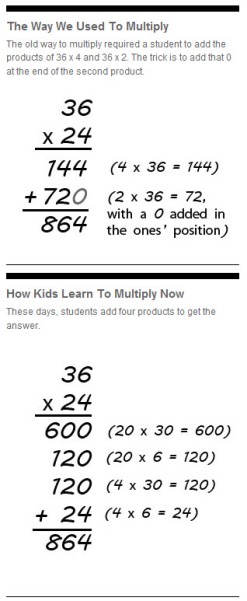Month: March 2011
Chart of Who Buys Oil From Libya
Video – Norwegian Northern Lights
Why You Can’t Help Your Kids With Math
 “That’s largely to reflect the different needs of society,” he says. “No one ever in their real life anymore needs to — and in most cases never does — do the calculations themselves.”
“That’s largely to reflect the different needs of society,” he says. “No one ever in their real life anymore needs to — and in most cases never does — do the calculations themselves.”
Computers do arithmetic for us, Devlin says, but making computers do the things we want them to do requires algebraic thinking. For instance, take a computer spreadsheet. The computer does all the calculations for you automatically. But you have to write the macros that tell it what calculations to do — and that is algebraic thinking.
“You cannot become good at algebra without a mastery of arithmetic,” Devlin says, “but arithmetic itself is no longer the ultimate goal.” Thus the emphasis in teaching mathematics today is on getting people to be sophisticated, algebraic thinkers.
That doesn’t mean that kids can skip learning their multiplications tables. “But the way it’s taught now is you get to the multiplication tables by understanding the number system and understanding what numbers mean,” Devlin says.
Lawyers Replaced by Computers
Computers are getting better at mimicking human reasoning — as viewers of “Jeopardy!” found out when they saw Watson beat its human opponents — and they are claiming work once done by people in high-paying professions. The number of computer chip designers, for example, has largely stagnated because powerful software programs replace the work once done by legions of logic designers and draftsmen.
Software is also making its way into tasks that were the exclusive province of human decision makers, like loan and mortgage officers and tax accountants.
Quantifying the employment impact of these new technologies is difficult. Mike Lynch, the founder of Autonomy, is convinced that “legal is a sector that will likely employ fewer, not more, people in the U.S. in the future.” He estimated that the shift from manual document discovery to e-discovery would lead to a manpower reduction in which one lawyer would suffice for work that once required 500 and that the newest generation of software, which can detect duplicates and find clusters of important documents on a particular topic, could cut the head count by another 50 percent.
The computers seem to be good at their new jobs. Mr. Herr, the former chemical company lawyer, used e-discovery software to reanalyze work his company’s lawyers did in the 1980s and ’90s. His human colleagues had been only 60 percent accurate, he found.
“Think about how much money had been spent to be slightly better than a coin toss,” he said.
via Armies of Expensive Lawyers, Replaced by Cheaper Software – NYTimes.com.

